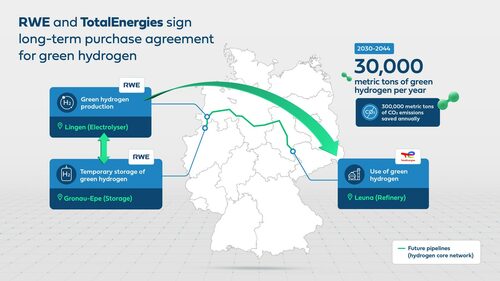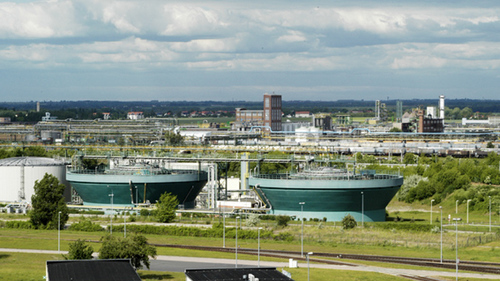RWE and TotalEnergies agree groundbreaking long-term offtake agreement for green hydrogen in Leuna Refinery, Germany
Essen – In a groundbreaking step for the hydrogen market, TotalEnergies and RWE have for the first time agreed on conditions for the purchase of green hydrogen over a period of 15 years. The agreement stipulates that TotalEnergies will purchase around 30,000 metric tons of green hydrogen per year from RWE for its refinery in Leuna (Saxony-Anhalt) from 2030. This is the largest quantity of climate-neutral hydrogen ever contracted from an electrolyser in Germany.
The agreement is a signal for the German market because fuel suppliers such as refineries are encouraged to gradually reduce their greenhouse gas emissions over time. Using 30,000 metric tons of green hydrogen in a refinery saves 300,000 metric tons of CO2 per year. That's how much 140,000 cars emit on average per year.
Markus Krebber, CEO RWE AG: ”We are proud to have secured the first long-term offtake agreement for green hydrogen of this size with TotalEnergies in Germany. Six months after the investment decision for the construction of the 300-megawatt electrolysis plant in Lingen, we have acquired an important anchor customer in TotalEnergies. This shows that hydrogen works with the right incentives for customers.”
Patrick Pouyanné, Chairman and CEO of TotalEnergies: “We are looking forward to developing further our partnership with RWE, our partner in several offshore wind projects in Germany and the Netherlands. This long-term green contract for green hydrogen marks an important milestone to reducing our CO2 emissions at our Leuna refinery. It will be made possible thanks to the completion of the H2 backbone by German authorities and their efficient support to green H2 customers like our Leuna refinery.”
Stephan Weil, Prime Minister of Lower Saxony: ”This contract also sends an important signal to the important energy city of Lingen and for the development of a hydrogen economy in Lower Saxony and throughout Germany. The production and marketing of green hydrogen on an industrial scale, which we as a state also support financially, is an essential prerequisite for the successful transformation of our industry towards climate neutrality. Lower Saxony is leading the way in this area in Germany: 50 per cent of the EU-approved production of green hydrogen in Germany is in Lower Saxony, and 20 per cent of the hydrogen core network is being realised in Lower Saxony. Now it is important to further strengthen industry demand and push ahead with the expansion of the hydrogen core network with all our power. We also need to design the framework conditions in such a way that hydrogen projects can be approved more easily and quickly.”
Dr. Reiner Haseloff, Minister President of Saxony-Anhalt: ”Saxony-Anhalt is a land of the chemical industry as well as of renewable energies. Green hydrogen is an important link between these two industries. Therefore, we support the development of a hydrogen pipeline network as well as the production and use of green hydrogen. The use of hydrogen is a central component for the maintenance and modernisation of our chemical industry. The signing of the contract between RWE and TotalEnergies underscores Saxony-Anhalt's prominent position in the ramp-up of the climate-neutral hydrogen economy. This will strengthen Saxony-Anhalt as a business location by using green hydrogen at TotalEnergies' refinery in Leuna and it will promote innovation and sustainable industrial jobs in southern Saxony-Anhalt.”
TotalEnergies needs significant quantities of green hydrogen to decarbonise its refineries in Europe. The company has invited tenders for 500,000 metric tons per year across Europe. The 30,000 metric tons that have been contractually agreed upon will be produced at RWE's 300-megawatt electrolysis plant in Lingen (GET H2 Nukleus), which will go into operation by 2027.
RWE operates its electrolysers with electricity from renewable energy sources. Under EU law, these electrolysers may only be operated with renewable electricity generated in the same hour as the hydrogen. In order to be able to reliably supply the contractually agreed hydrogen even at times when there is little sun and wind, RWE Generation will use booked capacities of the hydrogen storage facility in Gronau-Epe. A subsidiary of RWE, RWE Gas Storage West, plans to put this facility into operation in 2027.
Refineries already use large quantities of hydrogen today. This mainly comes from fossil natural gas, which causes high CO2 emissions. In Germany, fuel suppliers are encouraged to gradually reduce the greenhouse gas emissions (GHG quota) generated by their fuels, for example by 25% by 2030.The use of green hydrogen is one way for refineries to prevent CO2 emissions and thus meet their GHG quota.
The supply relationship between RWE and TotalEnergies will be facilitated by the German hydrogen core network. This will connect ideal hydrogen production sites, such as Lingen in Lower Saxony, with large centres of industrial hydrogen consumption, such as Leuna. The more than 9,000-kilometre-long pipeline network is to be phased into operation between 2025 and 2032 by both repurposing existing gas pipelines and building sections of new pipelines.
Latest news
INEOS launches €250m investment supported by the French Government to secure the future of French industry at Lavera
The project marks the first phase of a long-term regeneration plan to reduce emissions, boost reliability, efficiency and competitiveness, with support of the French State.
Hycamite’s technology to decarbonize shipping awarded AiP by industry leader DNV
Kokkola Industrial Park →Hycamite’s proprietary Thermo-Catalytic Decomposition (TCD) technology offers a new approach to producing clean hydrogen by breaking down methane, the primary component of liquefied natural gas (LN...
Clariant catalysts will power the Ecoplanta: Europe's first waste-to-methanol plant
Chemmed Cluster Tarragona →Repsol is building Europe’s first plant to produce renewable methanol from urban waste The facility will use Enerkem gasification technology to produce 240 KTA of methanol Clariant will supply cata...
Lilly plans to build a new $3 billion facility to boost oral medicine manufacturing capacity in Europe for patients worldwide
Netherlands site will bring 500 manufacturing and 1,500 construction jobs while further strengthening Lilly's global supply chain



